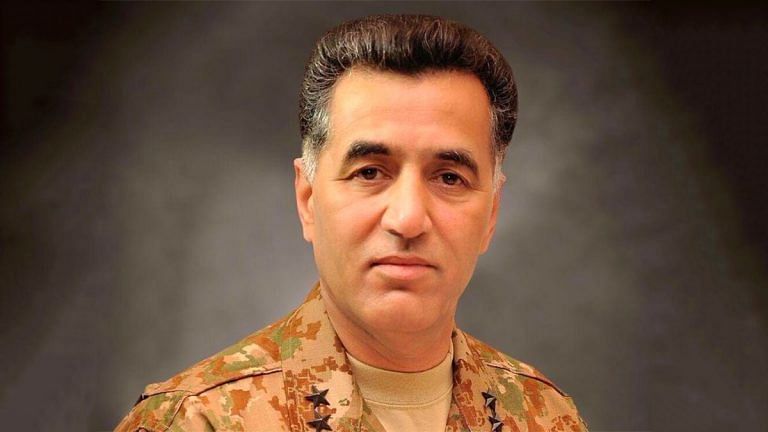New Delhi: In a move that will have ramifications not just in Afghanistan but also Pakistan’s military future, Inter-Services Intelligence (ISI) chief Lt Gen Faiz Hameed was appointed as the Peshawar Corps Commander Wednesday.
He will be replaced by Lt Gen Nadeem Ahmed Anjum, who was previously the commander of the Karachi Corps. Anjum was promoted to the rank of lieutenant general in September 2019 and is junior to Lt Gen Hameed who got his rank in April that year.
While there is much speculation in strategic circles behind Lt Gen Hameed’s transfer out of Pakistan’s intelligence agency, sources in the Indian defence and security establishment told ThePrint that the development is like a promotion for the Pakistani officer.
They noted that his appointment as Corps Commander paves the way for him to be in contention to become the next Army chief when current chief General Qamar Javed Bajwa, who is on extension, retires in November 2022.
Under Pakistani Army law, one needs to have a tenure of at least six months as the Corps Commander to be eligible to become Army chief.
Lt Gen Hameed, who is known as a hardliner and for being ruthless in his approach, is scheduled to retire only in April 2023.
Brushing aside claims that there has been a rift between Lt Gen Hameed and Army chief Bajwa, sources added that not only are the two close but the former is also close to Pakistan Prime Minister Imran Khan.
Also read: ‘World’s biggest destabilising force’ — India slams Pakistan for raising Kashmir issue at UN
ISI chief made Corps Commander after first plan did not materialise
Another set of sources noted that there had first been an internal attempt to make the post of ISI chief equivalent to that of Corps Commander, to ensure Lt Gen Hameed becomes eligible for the post of Pakistan Army chief.
However, this internal change could not take place and thus, he had to be appointed as Corps Commander.
Sources also pointed out that Lt Gen Hameed’s appointment as the Peshawar Corps Commander is of huge significance because he will have a prominent role in issues involving Afghanistan and the Taliban.
Furthermore, the new ISI chief, Lt Gen Anjum, is seen as a “professional officer” in Pakistan, which means that he is not personally ambitious and is expected to follow the Army chief.
Consequently, sources said that Lt Gen Hameed will continue to have close interactions with the ISI, Army chief and also the Prime Minister due to his appointment as the Peshawar Corps Commander.
According to Ayesha Siddiqa, an independent political and military analyst of Pakistan, Lt Gen Hameed’s appointment as the Peshawar Corps Commander will help him gain experience of dealing with the Americans and the Chinese since both parties have a stake in Afghanistan.
“This is a natural succession which will also see him in contention for becoming the next Army chief when Gen Bajwa retires,” she told ThePrint.
Also read: US Army is answering Congress on Afghanistan fiasco. But questions on Pakistan still missing
Took charge as ISI chief in 2019
Lt Gen Hameed had taken over as the ISI chief on 16 June 2019, in a surprise military shake-up. He had previously served in the ISI as the head of the powerful internal security wing.
He had replaced Lt Gen. Asim Munir, who had taken office as the intelligence agency’s chief just eight months earlier.
Lt Gen Hameed was promoted as Lt Gen in April 2019 and at the time, was appointed as Adjutant General at the General Headquarters (GHQ) of the Pakistani Army.
In a column for ThePrint, published in April 2019, Siddiqa wrote that Lt Gen Hameed was a “manipulator” who played a key role in building the 2017 protest of the Tehreek-e-Labbaik Pakistan (TLP), an extremist political party, to weaken the then Nawaz Sharif government.
He was also accused of manipulating a peace deal with militants from Barelvi, a Sunni revivalist movement. Both these instances were criticised by the country’s Supreme Court in 2019.
Also read: Pakistanis don’t care about 700 citizens in Pandora Papers but Imran Khan’s absence matters
